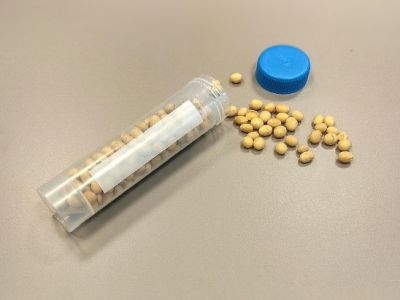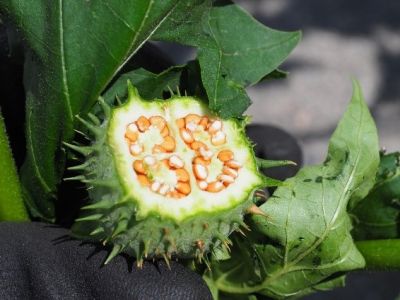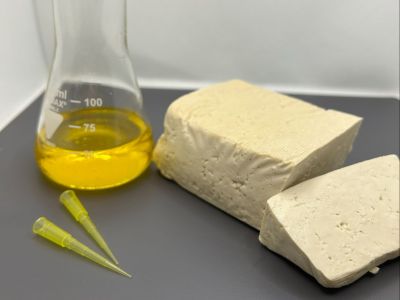MONITORING OF CONTAMINATIONS TO PROVIDE SECURE SOYA
Evaluation of tropane alkaloid reduction during soya processing

Soybeans
Picture: Bernhard Blank-Landeshammer

Fruit of Datura
Picture: Bernhard Blank-Landeshammer

Tofu and soybean oil
Picture: Bettina Schwarzinger
Soybeans are the most frequently grown legume worldwide by both cultivated area and yield. While soya products are already a major source of protein for animal feed, human consumption is steadily increasing. Due to their high oil and protein content, soybeans are a versatile basis for products like soya milk and tofu as well as traditional fermented foods such as tempeh or natto. Maintenance of high standards for food quality and safety is of utmost importance, because contamination of food crops with co-harvested, undesired plant material is a major threat for food safety. This holds true especially for plants grown under organic farming strategies.
The family of Solanaceae (nightshades) comprises a wide variety of weeds producing potentially toxic secondary metabolites, among them tropane alkaloids, specifically plants of the genus Datura (also thornapples, jimsonweeds or devil’s trumpets) and Atropa (belladonna, deadly nightshade). Contaminations with tropane alkaloids have recently been identified in a wide variety of food and feed crops as well as in consumer products. Plant-based foods also had to be recalled frequently due to contamination with tropane alkaloids, including soy products such as organic soy flakes. In the case of soybeans, the danger comes not so much from the alkaloid-containing seeds of weeds, which can be easily separated from the soybeans, but from contamination of the soybeans by contact with the alkaloid-containing sap from green plant material during harvest. This potentially will become even more evident in dry harvest seasons with early crop maturation.
In this project, we will investigate the concentration of the most commonly occurring tropane alkaloids atropine and scopolamine in harvested soybeans. For this purpose, we will develop and validate an LC-MS-based analysis method. Using this workflow, we will further assess the stability and prevalence of the tropane alkaloids during various processing steps, specifically for tofu production as well as their presence in soya oil. The goal is to identify crucial processing steps to reduce tropane alkaloid content in contaminated soybean batches that allow for their secure commercial utilization and will prevent product recalls, food waste and economic losses.
Lead Researcher:

FH-Prof. Priv.-Doz. Dr. Julian Weghuber
FFoQSI Area Leader GREEN
Head of Department
Food Technology and Nutrition, University of Applied Sciences Upper Austria
julian.weghuber@fh-wels.at
+43 5 0804 44403
www.fh-ooe.at

